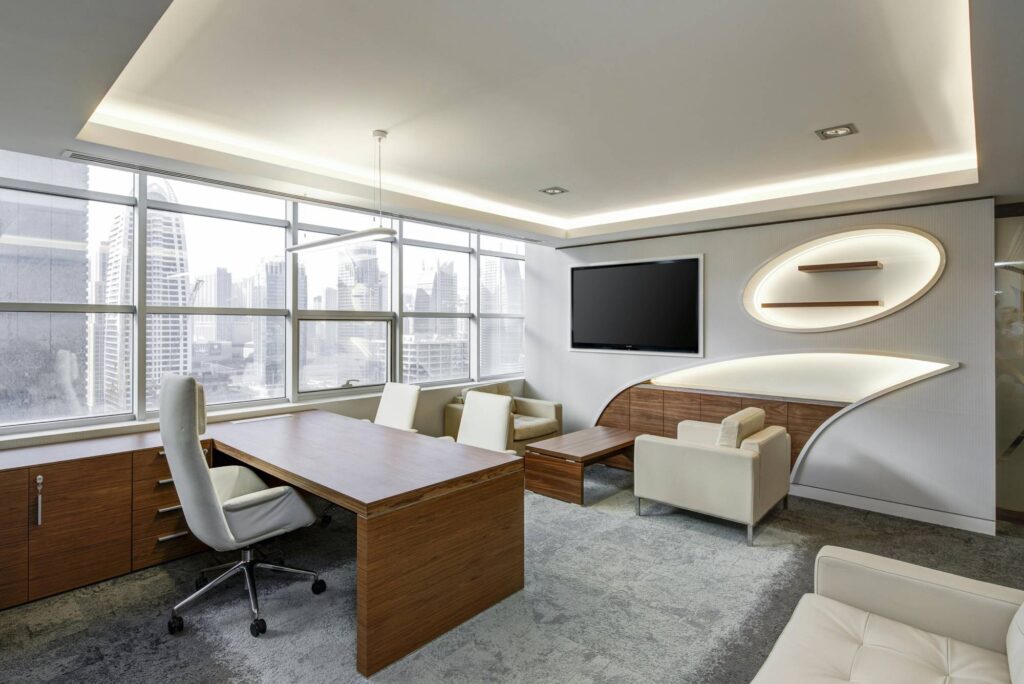Businesses that invest in purpose-driven workspaces often find a direct correlation between thoughtful office design and employee output. Among the most overlooked aspects of workspace planning is the selection of appropriate office desks for business environments. These desks influence posture, organization, communication, and overall workflow. As organizations grow and evolve, the need for tailored office desk solutions for companies becomes essential to maximize performance and satisfaction in the workplace.
Here are ways office desks influence workplace productivity.
✔ Standard desks promote deep focus and work best for roles requiring individual concentration.
✔ L-shaped desks support multitasking by offering segmented zones for digital and paper-based work.
✔ Multi-person office desks enhance space efficiency and encourage peer-to-peer collaboration and learning.
✔ Collaborative office desks foster open communication and creativity in team-based environments.
✔ Standing and sit-stand desks improve posture, energy levels, and have been shown to boost productivity by up to 45%.
✔ Modular and mobile desks offer flexibility and scalability for growing or project-driven teams.

Office desks actively shape the work environment. From supporting daily routines to influencing team communication, office desks for business directly affect how work gets done. The layout, design, and functionality of these desks can either drive productivity or create obstacles.
Choosing the right office desk solutions for companies is not simply a facilities decision—it’s a strategic move that affects communication, comfort, efficiency, and culture. Whether it’s a solo workstation or a set of collaborative office desks, these choices have long-term effects on productivity and workplace satisfaction.
Each job function demands specific desk features that enable productivity and reduce friction.
Workstation arrangements directly impact how employees interact with one another.
Modern work is tech-driven, and desks must accommodate that reality.
A poorly planned desk setup can lead to physical discomfort and long-term health issues.
Office layout reflects company values and workstyle expectations.
When desks are chosen with purpose, they become tools that actively support business goals.
No single desk style suits every team or business function. The productivity of employees often hinges on how well their workstation matches the demands of their role. The right desk fosters focus, efficiency, and collaboration, depending on its configuration. Below is a breakdown of popular office desks for business and how each type shapes workplace performance:
These classic desks are still a staple in most offices due to their simplicity and versatility.
Often used in corner office setups or for leadership roles, L-shaped desks offer more surface area without taking up much more floor space.
Designed for shared use, these desks are increasingly common in sales departments, call centers, and agile tech teams.
More than just shared tables, collaborative office desks are purpose-built to support creative teamwork and idea exchange.
Health and productivity often go hand in hand. These desks offer posture flexibility throughout the workday.
Best for dynamic businesses, these desks can be rearranged or expanded as needs change.

Choosing the right office desk solutions for companies involves more than aesthetics or budget. It requires a clear understanding of operational needs, team dynamics, and space planning. Here are actionable tips for selecting desks that maximize workplace productivity in White Plains, NY:
Is the space open, segmented, or remote-friendly? Understanding the layout helps determine whether to choose collaborative office desks or standard workstations. Also consider traffic flow and proximity to shared resources like printers, whiteboards, or meeting areas.
Creative roles may require multi-person office desks, while data-focused roles benefit from office desks with storage for paperwork and tools. Aligning the desk type with daily tasks ensures employees aren’t working against the limitations of their furniture.
Ensure each desk supports good posture, monitors alignment, and wrist positioning. Investing in sit-stand options for common areas can improve long-term health. Proper ergonomics can prevent chronic issues like back pain, eye strain, and fatigue, ultimately reducing sick days.
Modern desks must support cables, charging stations, and dual monitors. Select office desks for business that offer built-in grommets, USB ports, or wireless charging pads. Desks that support seamless tech integration eliminate the mess of cords and reduce setup frustration.
As businesses grow, desk needs change. Choose modular units that can adapt. Mobile desks and multi-person office desks offer scalability. Modular setups are ideal for project-based environments where teams frequently reconfigure based on task demands.
A cluttered workspace drains focus. Desks should offer drawers, filing units, or overhead compartments. An organized workspace enhances concentration, boosts productivity, and contributes to job satisfaction. Office desks with storage help maintain cleanliness and efficiency. Efficient storage also improves document security and minimizes the loss of important materials.
Gather feedback from employees on their needs and preferences. Their insights can inform decisions about collaborative office desks vs. individual setups. Involving staff not only ensures the right fit but also boosts morale and creates a sense of ownership in the workspace.
Opt for desk systems that can expand. Companies in flux should consider flexible office desk solutions for companies that accommodate growth and reconfiguration. Scalable solutions prevent the need for costly overhauls as teams expand or shift roles.
Pilot a few options in different departments to assess comfort and usability. Measure productivity impact before a full-scale rollout. This trial phase also helps identify layout flaws or feature gaps early, before committing to a large investment.
While it’s tempting to cut corners, poor-quality desks can lead to higher costs over time due to discomfort, repairs, or replacements. Quality office desks for business pay off through better performance and longevity. Think of desk purchases as long-term assets that support efficiency, health, and retention.
Your workspace should reflect your organization’s values, workstyles, and communication preferences. If your culture emphasizes openness and collaboration, opt for shared desk layouts and communal spaces. For organizations that prioritize individual focus and autonomy, provide partitioned or private workstations that support concentrated effort.
Don’t overlook the importance of long-term desk upkeep. Consider materials, finishes, and construction quality that can withstand daily wear and tear in high-traffic areas. Opt for low-maintenance surfaces that are easy to clean and disinfect, especially in shared or hybrid-use environments. Investing in durable, easy-to-maintain desks reduces long-term operational disruptions and replacement costs.
The best office desk solutions for companies combine ergonomic features, flexible design, and functional storage. Options like adjustable-height desks and modular setups support different roles and working styles. Adding office desks with storage improves organization and minimizes distractions, resulting in higher productivity.
Multi-person office desks promote real-time communication and seamless collaboration among team members. They maximize floor space while keeping departments connected and engaged. These desks are especially useful in creative, sales, or customer service teams where constant interaction is key.
Effective collaborative office desks should include open layouts, integrated power access, and enough space for multiple users. These features make group discussions and teamwork more efficient. They are ideal for promoting creativity, brainstorming, and cross-functional collaboration.
Office desks with storage help maintain a clean and organized work area, which boosts focus and efficiency. Built-in drawers, cabinets, and shelves allow employees to access tools and documents quickly. Organized spaces reduce clutter and save time, especially in task-heavy roles.
Modern office desk solutions for companies include modular, mobile, and hot-desking systems to support flexible schedules. These allow businesses to reconfigure workstations based on daily staffing needs. Desks that support shared use and easy customization help bridge the gap between remote and in-office work.
If you’re ready to transform your office into a high-performing, professional environment, now is the time to act. Stamford Office Furniture offers a full range of ergonomic, stylish, and functional office desk solutions for companies right near you. Whether you need multi-person office desks, collaborative office desks, or office desks with storage, our expert team has options tailored for businesses in White Plains, NY.
Contact Stamford Office Furniture today to find the right desks for your team and give your workspace the upgrade it deserves!